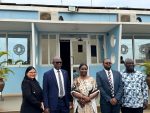Rural and urban development minister Erastus Uutoni has called on financial institutions to come on board and assist in the City of Windhoek’s plan to electrify approximately 4,000 households in the next 5 years.
This requires funding of N$15-20 million per annum.
“Electrification is essential to the well-being of our residents in all spheres of life, and we must strive at all government tiers to mobilise for the much-needed financial support for such projects,” further affirmed the minister at a electrification ground-breaking ceremony in Tobias Hainyeko Constituency last week.
Speaking at the event, Uutoni said that the challenges of rapid urbanisation and rural-urban migration, as well as their manifestations, among others, in the form of informal urban settlements and development, which is characterised by a mismatch between demand and supply in terms of urban services and infrastructure and poor conditions, can only be addressed meaningfully and sustainably through collaborative effort and investment by the state and non-state role players and partners.
“It is in regard to that our government, through the Ministry of Urban and Rural Development, remains committed to providing basic services to our residents and ensuring that our strategic objectives and national development goals are aligned. It is therefore that this initiative clearly demonstrates smart partnership, as alluded to, where central government, through the Ministry of Urban and Rural Development and the Ministry of Mines and Energy, in collaboration with local authorities, service providers, and community leaders, is working vigorously to bring electrification projects to where they are needed the most.
“Therefore, the provision of basic infrastructure and services remains one of the top priorities to the government at all levels, central, regional, and local. In this connection, the Central Government, through the MURD for the 2024/2025 financial year, allocated N$10 million, whereby I am informed that the Council allocated N$3 million of that for electrification projects,” he added.
The minister also took time to appreciate and encourage the Windhoek Municipality Council leadership and management to intensify these kinds of projects, saying that it is only through these types of initiatives that prosperity will be achieved.
“I would also like to single out and give special thanks to the Ministry of Mines and Energy for your commitment toward your urban and rural electrification initiatives that are very much visible, felt, and impacted many of our communities countrywide. Also, I want to applaud in advance the project engineers, contractors, and workers who will be working on this important electrification project. As we embark on this journey, I urge everyone to continue working together to ensure that this project is completed successfully and that the benefits are felt by everyone in our community. Let us continue to support each other and work towards creating a better future for our community. I thank you all for your dedication and commitment to our community,” he said.
Also speaking at the event, Windhoek mayor, Queen Kamati, said the City of Windhoek’s commitment to provide favourable conditions in the informal areas through the provision of basic services such as electricity and water.
“In collaboration with the government, local authorities, service providers, and community leaders, having been working tirelessly to bring electrification projects online. We remain collectively committed to the shared vision of improving the quality of life for our residents. For the 2024/2025 financial year, the government committed to providing financial support to co-fund electrification initiatives together with the Municipal Council of Windhoek,” Kamati said.
She went on to say that the 5-Year Electrification Plan was draughted in consultation with the Department of Housing, Property Management, and Human Settlement, which identified the informal settlements to be upgraded/formalised during the next 5-year period. To reach the targets of the plan, the City of Windhoek continues to seek funding of N$15–20 million per annum.
“We understand that the challenges faced by informal settlements are multifaceted. We are committed to continuing our efforts to provide basic services and address the challenges with a holistic approach. This will ensure that all essential services, like the provision of water, sanitation, health, and education, for example, are aligned to creating a supportive environment where communities thrive. To the residents of the Tobias Hainyeko Constituency, I say this: Your dreams and aspirations are what drive us to build a better Namibia.
“The Ministry of Mines and Energy, Ministry of Urban and Rural Development, Khomas Regional Council, City of Windhoek, and all other strategic partners are committed to providing basic services to our residents and ensuring that our strategic objectives and national development goals are aligned. Let us continue to provide these basic services with the support from funding partners, to whom we are ever thankful,” she concluded.










